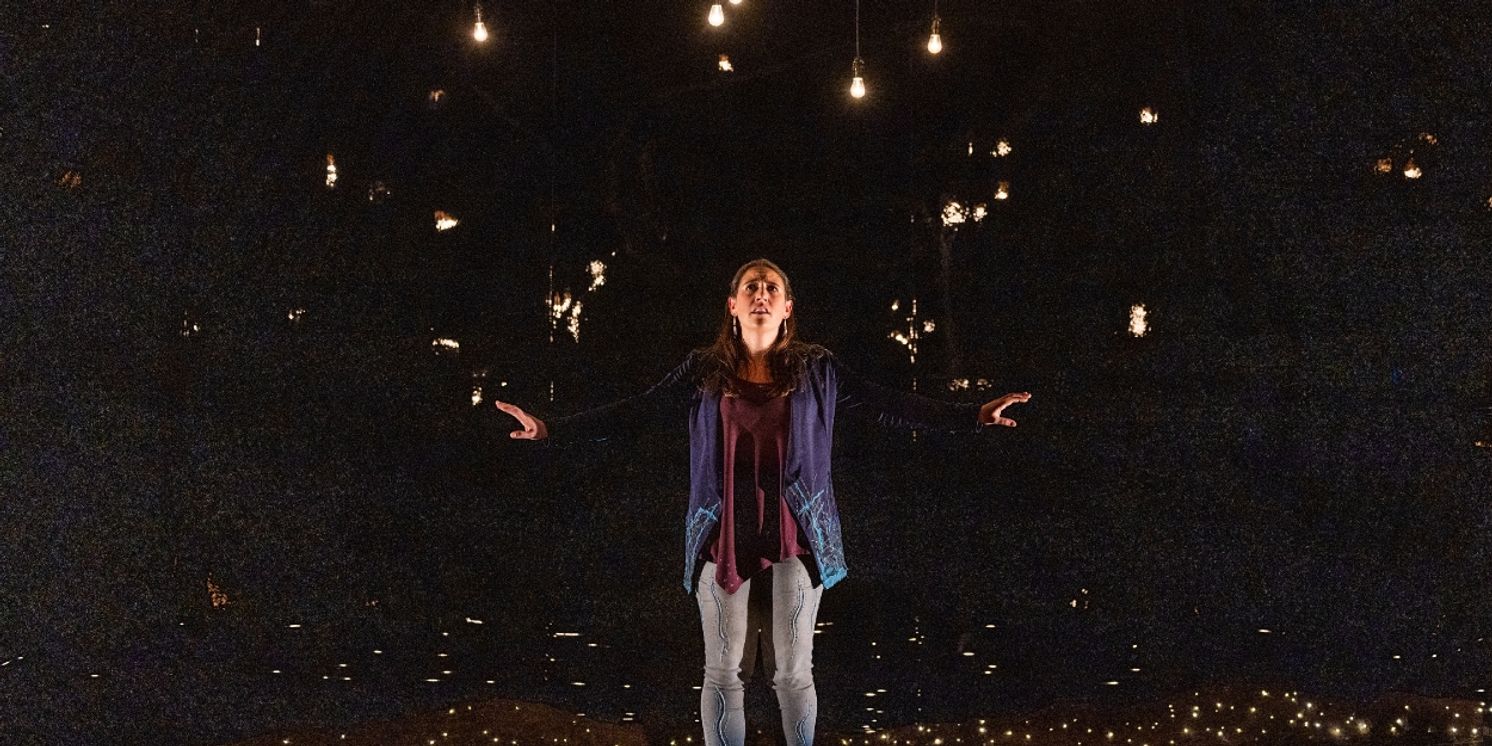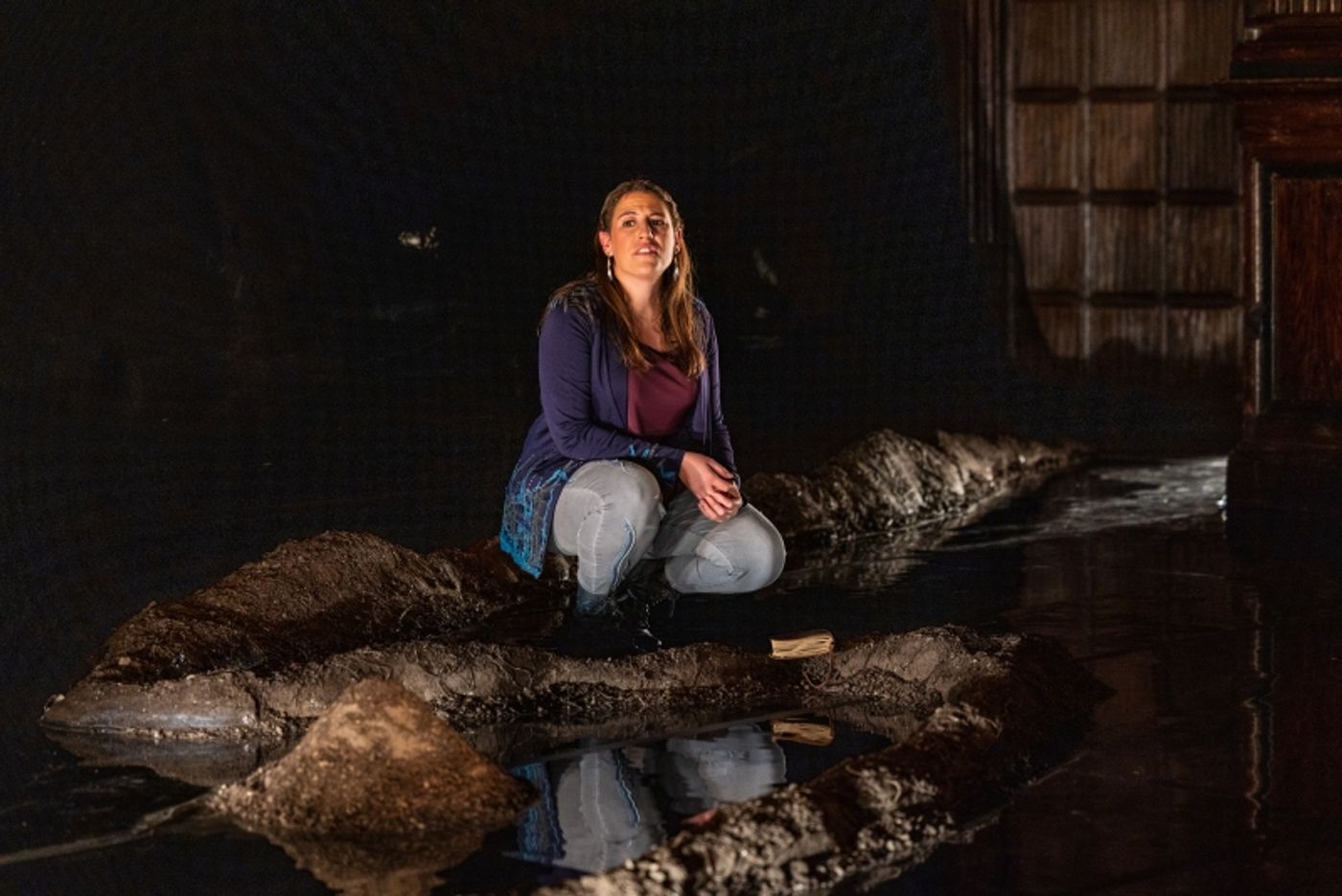Review: WHERE WE BELONG at Folger Theatre
“It’s a waste for humanity to not have the words it needs.”

Expressing ourselves through language is an essential piece of our humanity – our communities, our societies, our very civilizations have always been built on language and how we communicate with each other. Throughout our histories and cultures, the ideas of language, expression, and silence have played vital roles in our development and how we interact. So, it’s more than fitting, as Folger Shakespeare Library prepares to reopen its doors to its expanded and remodeled building, to focus on language in relation to theater and the land we use to showcase it.
Where We Belong, written and performed by Mohegan artist Madeline Sayet (whose autobiographical character is billed under her Mohegan name, Achokayis), has had a long journey to Folger’s stage. Initially premiering at Shakespeare’s Globe Theater in the 2019 Border Crossings’ ORIGINS Festival, Where We Belong was adapted in 2021 as a digital project for Woolly Mammoth Theatre Company and Folger Shakespeare Library before touring the US. The play showcases Sayet’s artful storytelling as she describes her journeys of academic and self-discovery. In 2015, Sayet moved to England to pursue a PhD in Shakespeare, and her play chronicles not just her findings in academia, but in a world that was moving to become simultaneously increasingly globalized and increasingly isolated. Facing a country that refused to acknowledge its role in colonialism or its lasting impacts, looming votes on Brexit and the US election, and her own questions about identity and community as she explored a shore so intimately connected and disconnected from her home, Sayet turned her experiences into a reflection on not just her own story and the writer she sought to study, but how we communicate and connect on a broader level.
Sayet’s script is heartfelt and insightful, and manages to do exactly what so many credit the Bard with: it captures a universality of the human experience. At the same time, it also manages to convey her isolation and the unique experiences she faces as a Mohegan woman, tapping into her cultural and personal histories just as readily as her broader and more universally recognizable humanity. It’s an incredible balancing act – one, it’s clear, she’s mastered out of necessity as much as out of desire for connection – and the result is a deeply moving and thoughtful script.
It makes sense that Sayet’s play is so poetic and profound – after all, the whole tale revolves around the vitality of language: the language of the Mohegan tribe, the language of Shakespeare, the language we use to talk about each other. Sayet explores the ways language can bring people together or draw lines between them, unite a people or erase them forever. Her complicated relationship with Shakespeare, a playwright she both loves and sees as a clear forced replacement for her own lost language, shines through her early recitations of his works, but is reflected and adapted even when she becomes more introspective and critical of his works and how they’re celebrated. Part of the weariness that she reveals from her time in her PhD program is rooted not in a weariness with Shakespeare, but the inability of her professors and peers to see the Bard’s work as moving, living art that should be engaged with, not just read on its surface. Incidentally, it’s Sayet’s understanding of Shakespeare that seems to guide her own writings – her play is her story, but it’s far from stagnant, and invites the viewers quite directly to engage with her tale. (And yes, I furiously scribbled more quotes than I could ever hope to repeat here.)
While language is key to Where We Belong, there’s another important theme that bears discussion, even in the context of this short review: colonialism and its lasting impact. While the United States has made some strides (at least in some states) in grappling with the complicated legacy of colonialism, it still feels fairly limited in most spaces – changing Columbus Day to Indigenous Peoples’ Day and land acknowledgements are small steps in the grand scheme of acknowledging the utter destruction of the tribal nations that existed on this continent before Europeans arrived. Sayet makes space to share stories that are often left out, histories that are papered over, cultural traditions and languages that were erased or mashed together into deficient and often insulting caricatures. But she also confronts the audience with a difficult and important reality: the perpetuators of colonialism, the victors of it, don’t see or contend with it the way its victims do. By staking her space in Where We Belong, Sayet pushes audiences to not only listen to her story, but to also reconsider the ones they think they know or have neglected to hear.

As wonderful as Sayet’s script is, it’s her performance that truly elevates her words. Moving around the stage, acting out key moments in her life and ruminating on her place in the world, Sayet is nothing short of captivating. Her skillful storytelling brings the audience on her journey with her, puts us so clearly inside her head that it’s impossible not to get emotional when she does, to become frustrated at how little those around her in academia and the theater world understood her, and to understand the conclusions she made and the steps she took, even before she reveals them. There’s always an intimate level of a one-person show that’s done well, but there’s a closeness that comes from the openness in Sayet’s performance that feels entrancing, that pulls the audience in and invests them in her words.
The intimacy of the production is also owed to Director Mei Ann Teo. It’s clear that Teo is also deeply invested in letting this story breathe, and her careful staging, with the help of Intimacy Consultant Chelsea Pace, reflects a care and thoughtfulness that elevates the whole experience. There’s a special skill to directing a single performer on a stage, and Teo’s shone through as Sayet moved throughout the theater. Helping solidify the impact of the production is the simple, yet symbolic scene constructed by Stone Dog Inc. and built by Stage Crew LLC, and the gorgeous and functional lighting brought to life by Hao Bai. Indeed, the whole production team deserves tremendous credit, because it’s clear that a lot of work has gone into ensuring this production moves seamlessly in a way that doesn’t disrupt the rhythm or enchantment of the show.
Where We Belong is a beautiful production, with a gorgeous script and an entrancing quality that can be attributed to the best of theatrical experiences. It shares some hard truths, some heart-wrenching moments and realizations (bring tissues – I’m still annoyed I didn’t), and challenges perspectives, but the love and care that shines through the whole production is incredibly compelling.
“When I speak Shakespeare,” Sayet muses, both a discovery and a plea, “people listen.” We should take care to listen to her own words just as attentively.
Where We Belong runs at Folger Theatre, in association with Woolly Mammoth Theatre Company, through March 10th. Additional information on tickets, special performances, accessibility, talkbacks, and many other features surrounding this production can all be found on the Folger website. Please note that this production does utilize flashing lights, and contains depictions of racism and discussions of borders, war, loss of language, residential schools, colonial theft of human remains, and repatriation. Performance run time is approximately 95 minutes.
Banner photo: Madeline Sayet in Where We Belong at Folger Theatre. Photo by Erika Nizborski Photography.
Additional information on Native languages and history in the DC area can be found in this document prepared by Woolly Mammoth Theatre Company: Indigenous History and Language Revitalization in DC.
Reader Reviews
Videos

